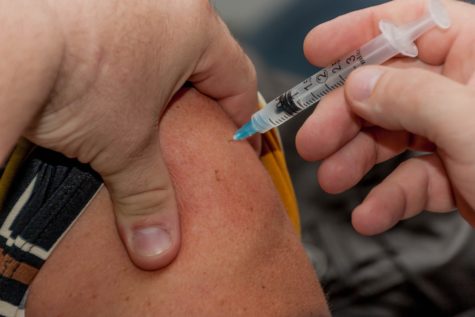NOTTINGHAM, England — Waking up on the right side of the bed on the morning you go to get the flu shot might help ensure you survive the fall and winter influenza-free. That’s because a new study finds that simply being in a good mood when you get the flu vaccine actually boosts its effectiveness.
Researchers at the University of Nottingham in the UK examined 138 older adults, aged 65 to 85, over the weeks preceding and following receiving an influenza vaccination.

Participants moods, diets, physical activity levels, and sleep were evaluated three times a week for six weeks leading up to the vaccination. Four weeks after getting the flu shot, the research team measured the level of the influenza antibody in each participant, and then again at 16 weeks.
The only factor that showed any correlation to the shot’s effectiveness was mood. Those who were the most upbeat in the six weeks leading up to the shot showed the highest levels of antibody.
What stood out to the authors in particular was how influential a participant’s mood was on the actual day of the shot. They found that those who were in good spirits on the day of their flu shot showed a greater level of the shot’s protective effects in subsequent weeks — accounting for up to 14% of the variability in antibody levels.
“We have known for many years that a number of psychological and behavioural factors such as stress, physical activity and diet influence how well the immune system works and these factors have also been shown to influence how well vaccines protect against disease,” says Professor Kavita Vedhara, from the university’s Division of Primary Care, in a press release.
Since the flu vaccine’s effectiveness varies year to year — the last two seasons it was about 48% effective, but just 19% effective in the 2014-2015 season, according to the CDC — these findings reveal a way to help ensure that one wards off illness, which is timely considering the recent commencement of fall.
Still, estimates show that getting the shot reduces the risk of the flu spreading among the general population by up to 60%.
Health officials highly recommend patients get their shots by the end of October. While the flu generally results in a fever along with upper respiratory symptoms, more serious health complications, including death, can occur among older individuals who contract it.
According to the World Health Organization, the flu kills 250,000 to 500,000 people a year.
The vast majority of fatal and non-fatal flu-related hospitalizations occur among those age 65 and older, the researchers note.
“Vaccinations are an incredibly effective way of reducing the likelihood of catching infectious diseases. But their Achilles heel is that their ability to protect against disease is affected by how well an individual’s immune system works. So people with less effective immune systems, such as the elderly, may find vaccines don’t work as well for them as they do in the young,” says Vedhara.
While previous studies had looked at individual variables that could influence the effectiveness of a flu shot, such as one’s nutrition, level of physical activity, or feelings of stress, no study had combined these factors, along with mood, into a more comprehensive inquiry.
It is believed that positive indicators on any one of these three variables may be correlated with improved mood, partially explaining why a good attitude may mean favorable flu shot outcomes.
The full study was published this month in the journal Brain, Behavior, and Immunity.

Because a good mood is about as effective on the flu as a flu shot.
Also known as a placebo.
Placebo being the flu shotbecause it is garbage. And a good mood elevates ones immune system. More garbage , fake science from the idiots trying to sell their snake oil called a vaccine.
It’s really a modern form of voodoo.
This is just too easy. Can the writers of this fake science really believe their own nonsense. A good mood effects the immune system in a positive fashion., period. So a good mood in combination with rubbing dog poo into your belly or carrying a lucky rabbits foot in your left rear pocket button actually improves the immune system. There’s 4 minutes of my life I’ll never get back. Please educate me more on your nonsense science. Retards.
Sticking a dried up pig stick in your ear increases your range of thought too.
Don’t know about that but it hurts a lot more if you have a stiff arm while getting the shot.
Flu vaccines contain poison and cause cancer, just like all vaccines.
How? Vaccines weaken immune system with toxic ingredients.
And, Vaccines are made with puss, some use pig puss, cow puss, chick puss, monkey puss, even aborted human baby puss. There are viruses in each of these puss mediums which are too small to be filtered out, and so you get the viruses injected into you, and many of these viruses are known to cause cancer.
Vaccination is a population control effort. But don’t believe this lowly commenter.
The vice president of British Children’s Cancer Hospital has already stated the chief cause in increase of cancers is due to VACCINATIONS.
There is no such thing as viruses free vaccine, but they do include many toxic ingredients.
Google “wiki list of vaccine ingredients” and read the items included in each vaccine, then see if you want those toxins injected into you or your children. Formaldehyde and mercury (aka thimerosal) are typically included. Also ask doctor or nurse or clueless person that injects you for the vaccine INSERT. Its a thin folded paper that lists all the side effects, all bad, even deadly.
FYI: US Healthcare system is No. 3 cause of death due to mistakes. No. 4 cause of death is pharma drugs side effects – Not as rare as pharma TV commercials claim.
Wise Sam, Don’t forget to let your kids roll around in the mud and stuff. These pampered pu…’s have a real problem with letting their little androids go out the backyard and let them get dirty. That’s how a kid gets used to this world. Puss…gross me out dude…but I believe what you said because, been there.
My wifes grandkid is the most pampered “gushy” kid I’ve ever known and his mom still…ain’t gonna say it, but uses charmin on him because he’s only 6 years old. Gross!
Can’t say what I want to but you’ve got the brains to fill in the rest.
What a crock. A “good mood” is a natural boost to your immune system! The flu shot is never the right combination at the right time for the “flu.” Eat right, exercise, and keep a positive attitude. Avoid the poison that they attempt to pump into your system.
A good mood is not having anyone bitching at you…she just wants to “cuddle” for about 4-6-8 hours, depending on her mood.
Maybe music, maybe wine, maybe a puff, but nooo government experts.
Only studying those who received the flu shot ensures that the credit goes to the flu shot. Good diet and being happy as effective as a flu shot? Can’t have that, now can we.
My DOCTOR told me to never get the flu shot. He’s a amazing MD who isn’t wined and dined by pharma companies. He said it’s a guess everywhere (as to the strain) when then formulate it, it still has mercury, and the ingredients in any vaccines are something to be concerned about. He practiced in the 80s when many people had vaccine reactions and it was widely accepted they were not safe for everyone.
My good feeling is that the flu shot gave me the flu for 2-3 years in a row. It was offered free of charge and I developed p nomia. The next year I told the good witch doctor to shoot herself in the ass with it. Haven’t had the flu since I stopped accepting the voodoo crap.
Go ahead and take one…I dare you. My old time doc took care of me through the pee nomia, but he was forced into retirement because he didn’t want to download all his “patients” info to the computer.
What the hell is a “patient”?
I think I see a “Chink in one’s armor – Wikipedia”
Learning experience for all of you who have gotten lost in the Games. From Google:
pa·tient
ˈpāSHənt/Submit
adjective
1.
able to accept or tolerate delays, problems, or suffering without becoming annoyed or anxious.
“be patient, your time will come” (Addendum by The Wood Chopper: Die if you like but don’t say you were not warned.)
Now I’ve heard everything.
Does this work for all vaccines?
How about this . . . A good mood lowers your risk of getting the flu?